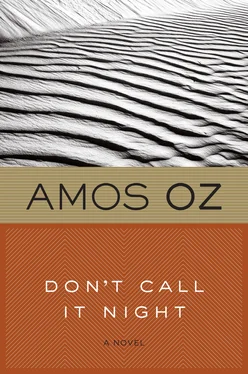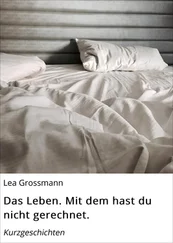But Noa didn't notice the fault when she wore the dress this evening. We went to hear the new quartet in a private recital at the home of Dr. Dresdner in the chic residential district. As we were setting out, I nearly stopped her and pointed out that the waist was not straight. I finally decided to say nothing, so that we wouldn't be late but also because there was something delightful and touching in this almost invisible defect. And it's possible that I'm the only one who can see it. If it really exists. Never mind, let it go until Noa notices it. And if she doesn't, it doesn't matter.
HE wears a rough elastic bandage on his left knee, because of an old injury. At midnight, when we got home from the musical evening at Julia and Leo Dresdner's, the pain started up again. It's only midsummer, yet he is already picking up signals from the distant winter. I sat him down in an armchair, removed the bandage and tried to disperse the pain with massage. He laid his fingers on my shoulder and said, Yes, go on, it's working. Theo, I said, this knee is a little warm, warmer than the other one, you should pop into the health clinic tomorrow. What's the hurry, he said, it comes and goes.
He got up and made us some herbal tea, and switched off the overhead light. We stayed sitting for a quarter of an hour by the soft glow coming from the kitchen. The windows and the balcony door were open to catch the night breeze. From the direction of the hills to the east came the dim sobbing of a fox and at once self-righteous dogs began howling around the buildings. Then I washed the elastic bandage in warm soapy water, confident that in the desert air it would be dry by morning. After that I took a shower, and Theo took one after me, then we went our separate ways to sleep. When I was almost asleep, or even already sleeping, a hushed woman's voice, suppressing a vague excitement, came to me from his bedroom: the late-night news from London.
Next day I went to an afternoon showing at the Paris Cinema with Tal. The film was about treachery and revenge. Afterwards we sat in the California for an hour and a half drinking iced coffee. Then I took her to Bozo's shoe shop, because I had made up my mind to buy her some new sandals, with heels. Sometimes she looks just like a ten-year-old child, especially when you look at her from behind. That Indian princess, Theo says, what are you scheming about all day long, hasn't she got any friends her own age?
We chose a pair of light-coloured sandals with a buckle on the side in the form of a butterfly. Tal refused to let me pay for them but I insisted.
Pini Bozo said: I've got something terrific for you, too. Try these on. Never mind, just for size.
In the end I bought myself a new pair of sandals too. They were flat and cream-coloured, with plaited straps.
A little later we met Theo in the square. He offered to treat us to iced coffee at the California. We burst out laughing and said, You're too late, that's where we've just come from. I asked him what he thought of our new sandals. Theo shrugged his shoulders, said, Nice, great. He screwed up his suspicious eye, just like a miserly peasant: Where are you going now? Then he shrugged again and summed up, All right. I'm sorry. I didn't ask. Only don't neglect your math exam. Logarithms. Actually I could prepare you for that exam myself sometime. I think I can still remember a thing or two. 'Bye.
What does he do all day long? He hardly seems to get any new commissions. It's summer. He still has a few old jobs to complete. Every morning at half past eight he opens the office, switches on the powerful light and sits down alone at his drawing board under a photograph of Ben Gurion staring resolutely into a desert landscape. He scribbles geometrical shapes. Or stands at the window watching the life in the square. At ten o'clock he goes down to Gilboa's to buy the paper. Then he walks round the square and returns to his office. Not long ago he told me that he had offered to take care of a family problem for his cleaner: he fixed up her husband and also her father-in-law with temporary jobs. In fact, all he did was to pick up the phone, it was Muki Peleg who arranged it. I didn't ask about the details even though I wanted to know, so that he wouldn't have the feeling I was watching him.
In the mornings I sit for an hour or two at my corner table in the library, facing the air conditioning, while the old librarian, Amalia, dozes behind her counter, shrivelled, grey, wrinkled, her lips sucked into her jaws as if she is mocking me; every now and again she lets out a faint snore, wakes up, gives me a wistful glance and then her chin sinks again and her eyes close with an expression of repressed pain. Once she was the director of the municipal gardening department, it was she who planted the avenues of palm trees and initiated the Founders' Garden; she adopted a Bedouin orphan who eventually grew up and emigrated; she got into an argument with Batsheva and took early retirement, fell ill with diabetes, and at the beginning of the year she volunteered to help refurbish the library. But the numbers of readers are declining. Amalia has filled the neat, well-lit reading room with dozens of well-tended indoor plants in hydroponic containers full of fine, brilliant gravel, watered by test-tube drippers with a mixture of fertilizers and minerals, as though the place is gradually changing from a library into a hothouse or a dense tropical forest, with creepers and ferns branching out, climbing in and out of the shelves, pushing their way among the volumes, translating the neon light into dark vegetal sap. But nobody ever comes here except for me and some pensioners and a handful of weird youngsters. Empty. Most mornings there is just the ailing librarian and myself.
The books about drugs, addiction and treatment that were kept on a special shelf for me all these weeks have been dispersed and returned to their places. Now I have to prepare for the coming school year. But what's the hurry? Instead of the poems of Bialik I have selected a few books about the lives of musicians. Maybe because Julia and Leo Dresdner from the dental surgery telephoned to ask me to serve on a committee for helping immigrant musicians from Russia to settle in. There are plans to found a small music school with the co-operation of the high school, the Workers' Council and the municipality. It may be possible to bring in the Ministries of Absorption and Culture too. A meeting has been scheduled for next week with Batsheva. I have been asked to draft a letter addressed to a handful of classical-music lovers, to find out who will contribute. Linda has volunteered to type it, and Ludmir and Muki Peleg will distribute fifty copies.
I sit in my comer near the window at the end, wearing a flowery summer dress, leafing through the books and stopping here and there to read two or three pages about the strange love of Brahms for Clara Schumann, the illness and death of Mozart, and plump, shy Schubert, whom it is doubtful any woman ever loved except his mother and who described his own compositions as mediocre and ephemeral; he appeared in a public concert only once, before dying of typhus at the age of thirty-one. My eyes stray from the book to the shady plants. I remember my father's collection of postcards. Amalia is staring straight ahead with hollow eyes, huddled as though in pain. Her hair is thin and dry and her cheeks in the neon light are sunken like the face of a corpse. Muki Peleg told me that once, in the fifties in Beersheba, she was the beauty queen of the desert, she divorced, remarried, separated, danced on a barrel in a bathing suit at the wine festival procession, turned all the men's heads, seduced the drilling workers, lived with a well-known poet. The years passed and illness ravaged her and now behind her back they call her "the witch".
Читать дальше












